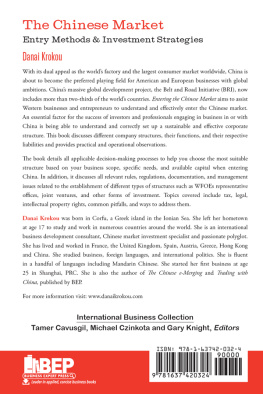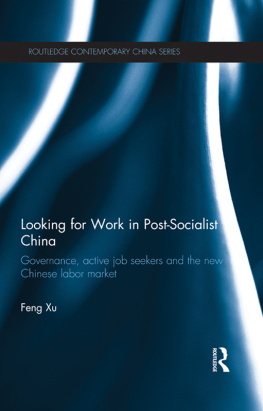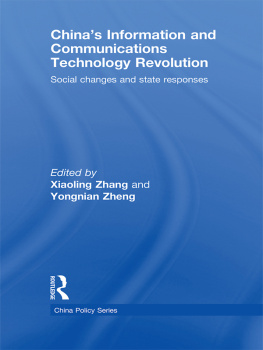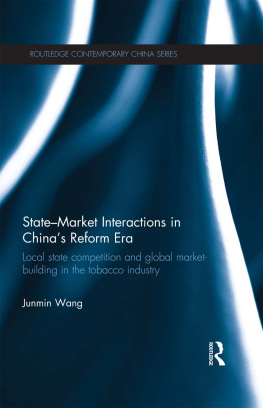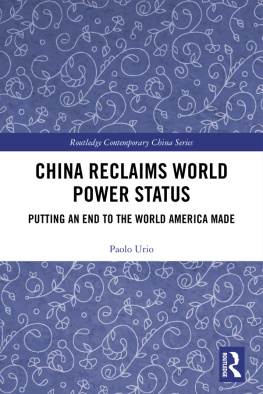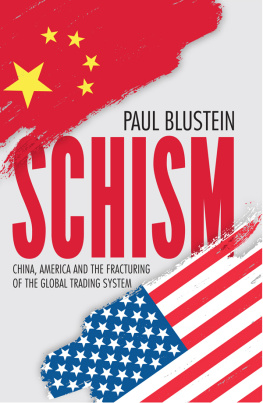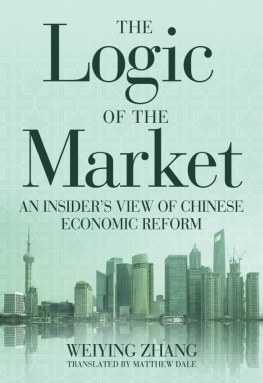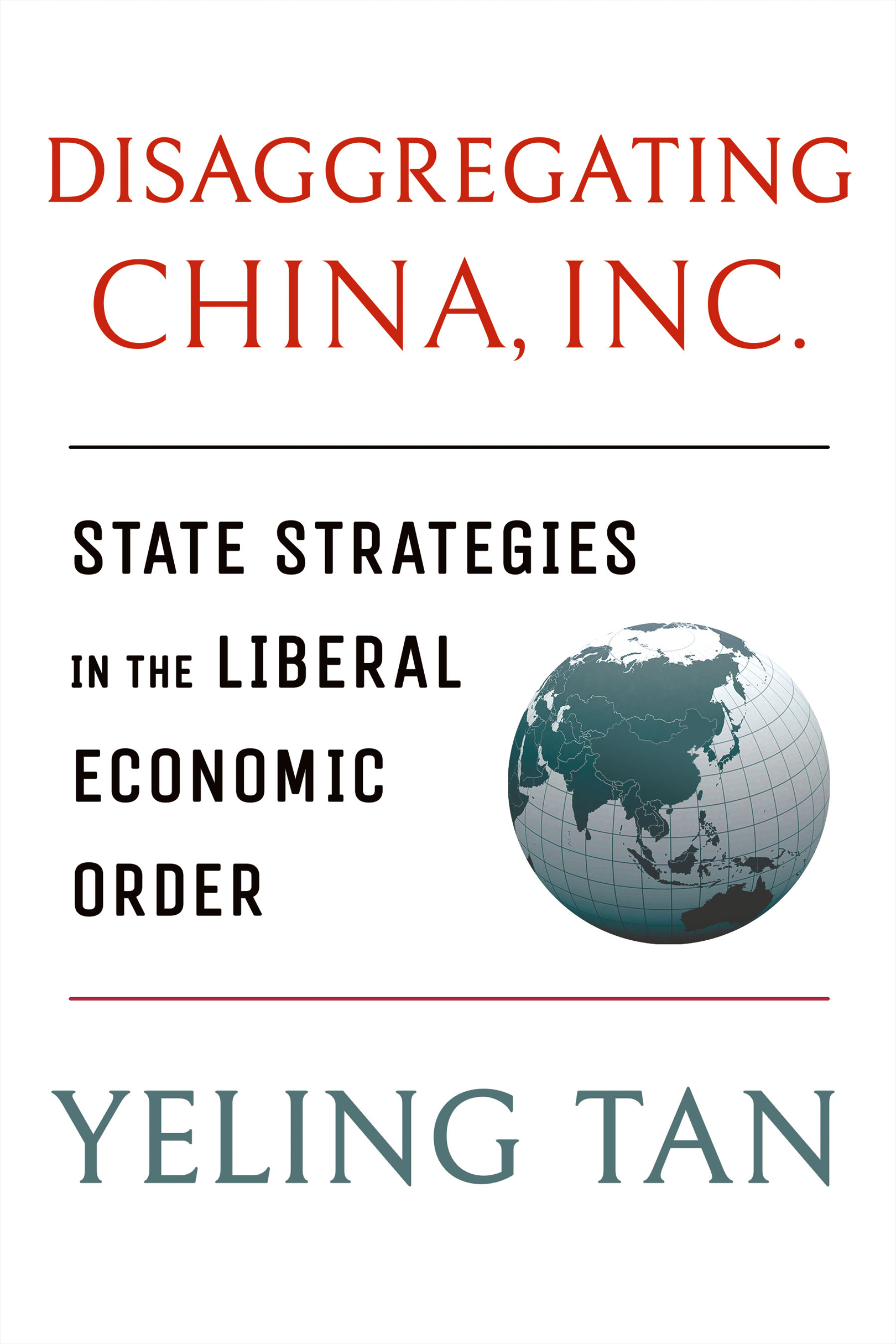Contents
Guide
Pagebreaks of the print version
Disaggregating China, Inc.
State Strategies in the Liberal
Economic Order
Yeling Tan
Cornell University Press
Ithaca and London
For my parents
Contents
Figures and Tables
Figures
Theoretical framework
Example of a directive document
Example of a developmental document
Example of a regulatory document
Difference in strategies between coastal and inland subnational governments
Prevalence of regulatory, developmental, and directive strategies in central, provincial, and local regulations
Average tariffs imposed on Chinese manufacturing imports
Topic responses of central, provincial, and local governments to tariff liberalization
Marginal effects of accountability on provincial developmental strategy as trade openness increases
Marginal effects of industry diversity on provincial developmental strategy as WTO exposure increases
Predicted responses from the central government
Number of sector-specific regulations issued per year by the SAQSIQ
Prevalence of different strategies in SAQSIQ regulations (including the China Inspection and Quarantine bureau and the Certification and Accreditation Administration)
Change in business climate sentiments of US firms in China
Occurrence of the word innovation in central, provincial, and local regulations
Number of sector-specific regulations issued per year by agency
FDI flows into China, 19802016
Relative activism in developmental policies, automobile and semiconductor industries
Change in types of semiconductor firms over time
Change in types of automobile firms over time
Relative activism in developmental policies across three industries
Timeline of economic agency restructuring
Tables
Sample of document titles
Factors affecting relative policy activism
Pre-WTO (19982001) industry policy trends and WTO tariff cuts
Do industry characteristics predict tariff cuts?
Central government responses
Provincial government responses
Local government responses
Summary statistics for provincial autonomy variable
Summary statistics for industry diversity variable
Response of provincial developmental strategy to change in accountability
Response of provincial developmental strategy to change in industry diversity
Acknowledgments
I owe the greatest debt to Peter A. Hall, whose counsel and scholarship has shaped incalculable aspects of this book as well as my approach to the study of politics. Over countless hours of conversation/interrogation, Peter posed difficult questions and tore apart my arguments while at the same time offering paths forward, channeling my focus toward a better iteration of a partially formed idea. More than these specifics, I have learned from him how to be tireless in the pursuit of a research question, to be exacting in formulating the answer, and to be a supportive and generous colleague. I hope that over the course of my career as I strive toward Peters model of scholarly inquiry, I will be able to do justice to his teaching and mentorship.
Tony Saich has been a source of invaluable guidance since my days as a masters student, offering a broader perspective and wisdom at moments of doubt. He has pushed me to think about and analyze Chinese politics with greater nuance and to never take any one point of view at face value. Beth Simmons provided unstinting support and encouragement throughout every step of my doctoral student career, from the first international relations seminar to the anxieties of the job market and beyond. Her frank and precise comments pinpointed areas of weakness but in ways that always left me energized and motivated to do better. I benefited immeasurably from my conversations with Robert Z. Lawrence, many of whose insights into the political economy of trade and globalization have found their way in some form or another into this book. Together, these scholars formed a dissertation committee that a graduate student could only dream of having.
My gratitude extends to a broader community of scholars from whom I have drawn inspiration and whose advice and insights have helped me to become a better academic. Dani Rodrik sparked my interest in global economic governance and industrial policy and has provided encouragement and constructive critique in equal measure. Tom Christensen, Christina Davis, Will Norris, Margaret Pearson, Ben Ross Schneider, Dan Slater, Rory Truex, Arne Westad, and the two anonymous reviewers from Cornell were incredibly generous in taking the time to read and offer comments on my draft manuscript. This book is much transformed from its early guise as a dissertation as a result of their sharp advice. I have also benefited from conversations with Suzanne Berger, John Donaldson, Henry Farrell, Archon Fung, Steph Haggard, Iain Johnston, Abraham Newman, Craig Parsons, Elizabeth Perry, Meg Rithmire, Susan Shirk, Ryan Sheely, Yuhua Wang, Michael Walton, and Mark Wu.
This research would not have been possible without the support of multiple institutions. My gratitude goes to the Harvard Weatherhead Center for International Affairs (WCFIA), the Fairbank Centers Desmond and Whitney Shum Fellowship, Harvard Universitys Frederick Sheldon Traveling Fellowship, and the China Scholarship Council for providing generous funding that made this book possible. My thanks go to Michelle Lamont, Erez Manela, Ted Gilman, and Clare Putnam, for creating a warm and stimulating environment in the WCFIA Graduate Student Associates program. The Ash Center for Democratic Governance and Innovation welcomed me to its events and provided several opportunities for me to present my work, and for this I am particularly grateful to Tony Saich and Kaori Urayama. Additional thanks go to the postdoctoral fellows at the Ash CenterKyle Jaros, Sara Newland, Chen Huirong, Manfred Elfstrom, and Li Yaofor their feedback on various stages of my work. The China and the World program at Princeton and Harvard provided an ideal postdoctoral environment in which to turn this dissertation into a book, and my heartfelt thanks go to Tom Christensen and Iain Johnston for inviting me into the exceptional community of scholars that they have built over the years. Peter Katzenstein, Roger Haydon and Emily Andrew at Cornell University Press provided expert advice as well as good humor in shepherding this manuscript into its final form, and I am truly grateful for their guidance. I am further grateful to the University of Oregons department of political science and the Oregon Humanities Center for their valuable financial support toward the publication of this book.
I am equally indebted to the institutions and scholars in China who made my fieldwork possible. I am grateful to Peking Universitys National School of Development and to Dean Yao Yang for welcoming me to Langrun Yuan and for providing a wonderful intellectual home while in China. I am also grateful for the warm collegiality extended by the Peking University faculty, including Professors Yu Miaojie, Yang Rudai, Xi Tianyang, Li Lixing, Zhao Bo, and Fu Caihui and many others. My thanks also go to the students from Peking University and the China University of Politics and Law for their superb research support. I am additionally grateful to Tsinghua Universitys School of Public Policy and Management for generously providing a stimulating professional environment during my multiple visits to China. My knowledge and understanding of Chinese economic policymaking have been greatly enhanced by conversations with Professors Yu Qiao, Hu Angang, Gao Yuning, Chen Ling, and Wei Xing. I would also like to extend my appreciation to the American Chamber of Commerce for generously sharing data from its annual Business Climate Survey. Additional thanks go to the International Center for Trade and Sustainable Development for kindly inviting me to its events in Beijing.


